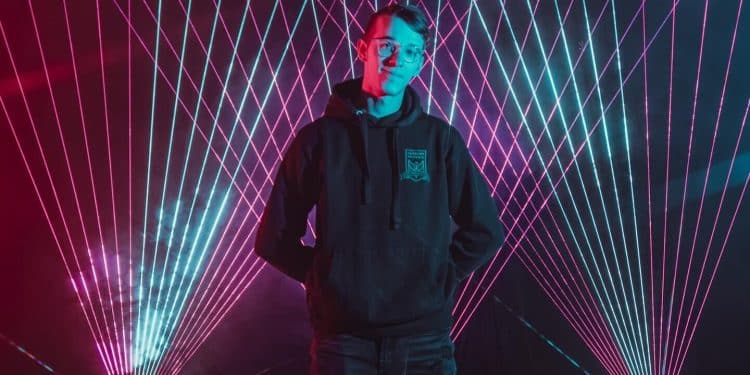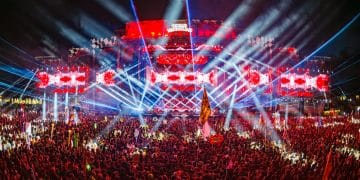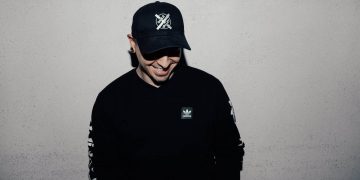Pigeon Hole sat down with us at Bamboo Bass Festival to chat about their history with Sleeveless Records, their goals as artists, and their plans for the future.
Lee Napthine and Colin McCue are better known as Victoria-based bass music duo Pigeon Hole. Thriving for years in the hip-hop world, Pigeon Hole was eventually struck by the charm of electronic music and slowly gravitated to that realm, bringing their hip-hop roots with them.
Through the development of their sound and dual identity, they’ve been lighting up the scene with their energy and fresh perspective. After eventually reconnecting with their old hometown friend Stylust, they soon became an irreplaceable part of the Sleeveless family.
With a little luck and a lot of hard work, Pigeon Hole is making themselves known and embedding themselves further in the West Coast bass music scene with an ever-widening reach. One testament to this, among many, is their presence in Shambhala’s official 2018 trailer.
Check out our interview with Pigeon Hole from Bamboo Bass Festival and learn more about their history with the festival, their development as artists, and why the British Columbia festival scene has given rise so many talented West Coast musicians.
Stream Pigeon Hole’s Shambhala Music Festival Series Mix on SoundCloud:
Let’s start with Bamboo Bass Festival. What about this festival stands out to you guys vs the others you’ve played/ been to?
Colin: For one, obviously, the location. We’re in a beautiful place, and it’s cool because you wind up running into so many familiar faces and artists from back home. But it feels like you’re all on a huge group vacation together.
Lee: And I think as far as going outside of North America and places in Europe, being able to come down to a tropical country for a bass music specific festival is a rarity.
Absolutely! Have you been to a bass music festival anywhere else, really?
Colin: Yeah, for sure. We’ve played Emissions in California, which is pretty much just strictly bass music.
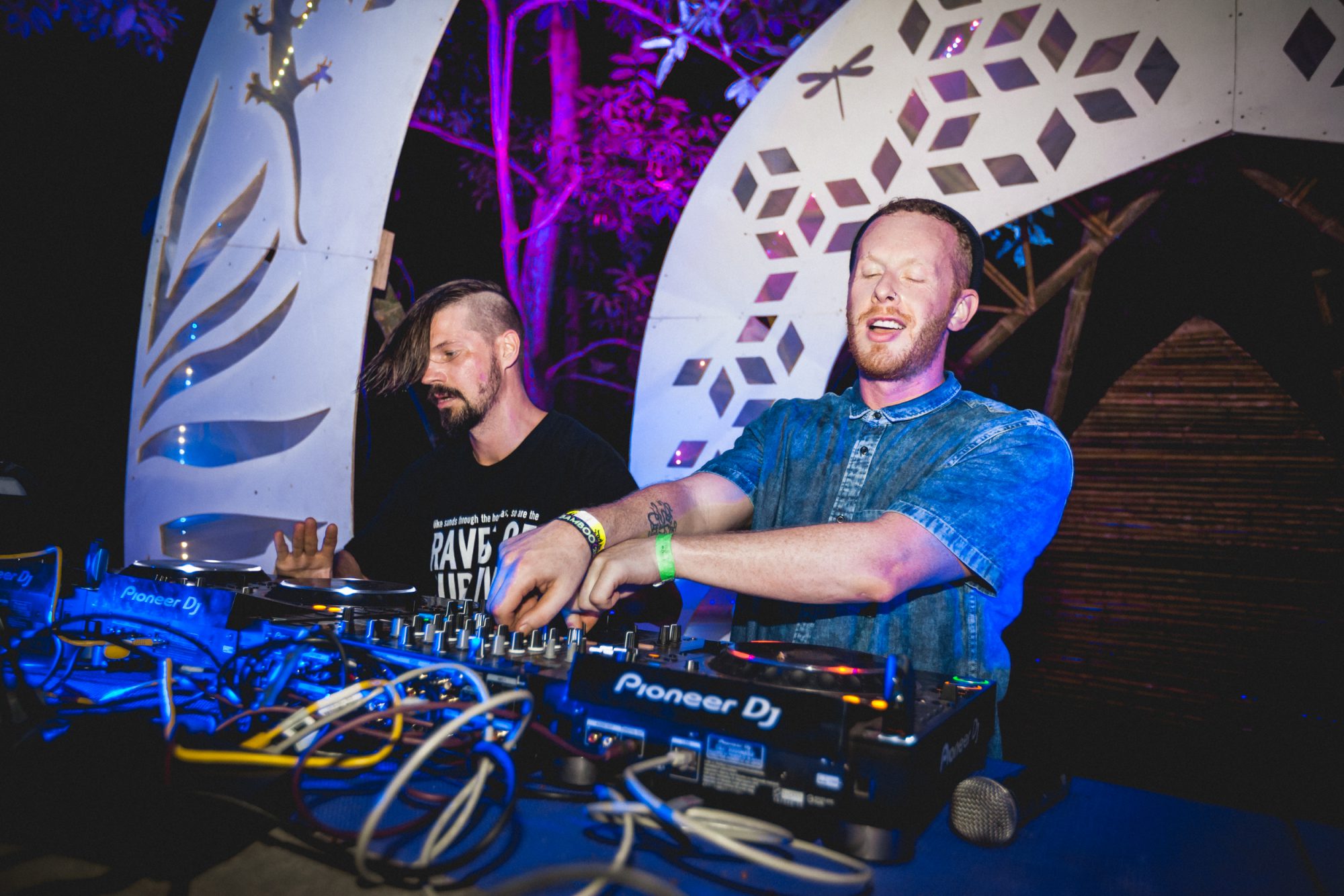
So you started in the 90’s with hip-hop. What brought you to the electronic realm?
Colin: I mean we started playing festivals and raves as a hip-hop group and just like seeing the music that like other producers were making and playing on these huge sound systems, and just the reactions they were getting from the crowd. And the reaction that we were having to it.
It was just like, we got really into it, and all of a sudden that was the kind of music we were listening to more. And that was just inspiring what we were doing. Things just kind of naturally took a turn like that for us, and all of a sudden we were making totally different stuff from when we started out making.
Lee: We had been making hip hop music for like 15 years. I mean, we started off in high school. Touring around with the Sweatshop Union. And I think the group itself, Sweatshop Union, was kinda coming to an end with the other guys all having families and other parts of their lives. But me and him, we were just getting involved and influenced by a whole new set of festivals and music that was coming out at the time that we just didn’t want to stop. And keep evolving.
Colin: I mean, I think for us, part of our sound and what we really like about music, and one thing that attracts us to music, both as listeners and watching other people perform, is kind of like an energy and excitement thing. And so, coming into this world, like the shows were hype, the crowds were hype, everyone was connecting and getting right into it, ya know what I mean? Whereas, at that point when we were kinda doing hip-hop, you didn’t really get that…
Lee: …that primal energy. The music had gotten kinda subdued a bit, it had become either mainstream or some of it super underground, but the energy itself had really taken a dip.
What inspires your music now?
Colin: I mean, I guess, still the same kind of thing: that excitement and energy. I think that’s one thing I love about music and why I continue to do it. It makes me feel alive and excited about life. It totally gives you like a refreshed outlook on life. You know when you go to a good show and you hear a rad song, it just cranks up the volume on life in general.
Lee: Ya, it’s kind of like, if you meet me on a dead day, I’m usually a pretty subdued, quiet person. But if you find me making a song where I’m in the zone in the studio, or you see me on stage for that hour, it’s a huge release being able to be up there, and have that kind of energy output.
Colin: So, coming across other artists where they make songs that give you that feeling, it’s just like more fuel to the fire. It just pushed you to give that feeling to someone else.
It’s amazing that you can initiate that feedback between artist and audience. It’s a conversation.
Colin: Oh, absolutely!
Lee: Exactly, it’s a relationship. It all starts with… well, who knows where it starts? It’s a chicken and egg thing. Sometimes you can go to a dead crowd and you either have to charge them up, or they need to charge you up.
What connected you to Stylust?
Colin: We’ve actually known Stylust for years and years, back when we were strictly a hip-hop group; back when he lived in Vancouver, he used to run a studio as an engineer. We recorded a lot of our earlier hip-hop records with him in the studio just as an engineer.
He was just a homie from back home that we knew. And then he moved away and started producing and DJing and things really took off for him. It just happened to coincide where we kind of switched lanes. He had kind of laid this groundwork and had a home base for us to kind of find a home for our music, which is rad.
Just in the right place at the right time, kinda thing.
Colin: For sure, yeah! And that’s the trippy thing about this whole world for us is we are constantly running into friends from back in the day, in our hip-hop world, who now you wind up finding out “so and so” is a DJ. They’re living across the country over here, or whatever. You show up at a party and they’re there doing their thing. It’s a trip; it’s such a small world.
Did joining Sleeveless Records alter your dynamic or style, or did that coincide with the organic change you were already going through?
Lee: No, I think Geoff was already creating kind of a vibe for his label that was suited to what we were doing. ‘Cause we’re both West Coast, ex-hip-hop producers, right? So the influence of hip-hop was always there… The West Coast sound was always there. Just was a natural fit.
Why has British Columbia been developing so much amazing music?
Lee: It’s gotta be the festival culture! I think if you really look up and you look at Bass Coast and Shambhala, you’re looking at the two, not the biggest, but two maybe of the foremost best festivals on the West Coast, which is already a massive festival culture.
Colin: And people just love it. There are so many smaller festivals that are equally as awesome and people really love getting into the music, and are genuinely stoked to be there partying and to be feeling the music.
And the community I feel like, too.
Colin: Yeah, for sure.
Lee: All the artists intermingle, even regardless of genres. There’s a community where all the artists support each other, they’re friends with each other, but like any community of artists, you get that internal competition, you know, where you’re comparing yourself to your peers and you’ve got to be better for that reason cause you wanna be better, right?
You guys had a couple hits that kinda blew up in the last year, like “Headnod” and “6am”. What was your reaction to the international support for those?
Colin: Yeah, we’re actually blown away. That’s the coolest feeling possible. Cause, I mean, we’ll make music always, whether someone’s listening to it or not. But then when you get that support from your peers, and then artists that you look up to and admire that inspire you, it’s just mind blowing. You honestly never really, I dunno, expect that to happen, haha.
Lee: You know there’s maybe just the odd rare time you hear your music at a festival, but it wasn’t until this last summer where we would go to festivals and, you know, every set you’d get to catch a tune of yours. That’s like… the cosign from artists you’ve been looking up to and is a huge part of the reaffirming feeling that what you’re doing is the right way. Keep on going home spending all the time in the world making more music.
Is there a signature element to a song that you think sounds like you that you try to maintain?
Colin: Not really, I think in the past we’ve kinda been all over the map with our sound. Now I guess it’s a little more, kind of, honed in. But again, I think the tying factor in all of our music is just that we always want it to be exciting and high energy.
And even if we make kind of a laid back song, which we don’t really do, there’s always some element, like hypeness behind it. You know, that’s just cause when we start working on a song then we start getting into it once it feels like it’s taking off the ground, and it runs away on its own like that.
Lee: And it always has to have kind of textury elements that are a bit dirty, a bit underground sounding. That’s kind of just in our nature to move toward that sound.
Yeah, I feel like that blends well with the Sleeveless thing, too. There’s that gnarly, crunchy, grimy sound.
Colin: For sure. Well yeah, coming from the hip-hop background, we’d always be sampling old dirty records and things like that, right?
Lee: Looking for the oldest rock and jazz records where everything sounded all super lo-fi and mono and had old sounds. And you like to have that in electronic music, but just on a bigger scale, haha.
Invasion, your new EP, was rad. I really liked “Come Widdit”, which has that halftime drum & bass sound that you’re kind of on the pioneering end of. Tell me a bit about where it kind of came from, and who else is doing it.
Colin: I mean, that whole kind of sound really struck a chord with us because it is so much like hip-hop. It feels like it’s just running parallel with hip-hop. It’s the closest thing in this whole world of music to hip-hop.
Lee: I think we were coming out in the beginning, ya know, we first made the transition from rap music into listening to dubstep that was going on at the time. We were like, “This is hip-hop, but ya know… not quite.” It sounds like it’s influenced by hip-hop, but it’s still like a very different sound.
And then kinda moving into trap, which was definitely rap music, but it wasn’t like that underground rap music that we were making. It was more like Southern gangster rap music, what we were into, so we were making that shit. But it didn’t really lend itself to us rapping on it, because it just didn’t work that way.
So it wasn’t until the drum & bass halftime came around that we were like, “Oh this is actually music that we can bring back.” The rap elements that we used to make, with the electronic music that’s comin’ out, and have that be a full hybrid thing.
Are there any interesting tidbits about the EP? I know one of y’all was involved in the artwork.
Colin: Yeah, I do a lot of layouts, stuff like that. But I didn’t do the art itself. Just helped with the layout. Yeah, but I help on a lot of promo material stuff for Sleeveless. Like I said, it’s like a family, right? I’m always stoked to help them out in any way I can, because they’ve helped us out so much.
How are you guys hoping to evolve as artists? Is there anything new you’re looking forward to this year?
Colin: I mean, we’re really trying to work the vocal side of what we do back into it. Cause it’s always been a part of our live performance, but we haven’t really been actively releasing any tracks with our own vocals on them so much. Occasionally we’ll do vocal samples of ourselves where we do the hook on one of the songs or something like that.
But yeah, we kinda wanna bring the hip-hop side of things even more back into it because that was the original goal when we did switch lanes. We were like, “Yeah, we’ll do our hip-hop shit, but in this world,” where it makes sense. So I think that’s the goal.
Lee: When you see us live perform and stuff, I mean, 10 to 15 years of being rappers on stage, we’re natural performers at this point, right? So it actually took a lot of restraint for us to just be able to just sit back and DJ and not bring that. But it kinda felt like something was missing during the live performances.
So we actually have songs where we can come out, interact with the crowd and keep it party rocking, not disrupt the dancing element of the show, but trying to find a happy medium for being able to keep the party live while rapping.
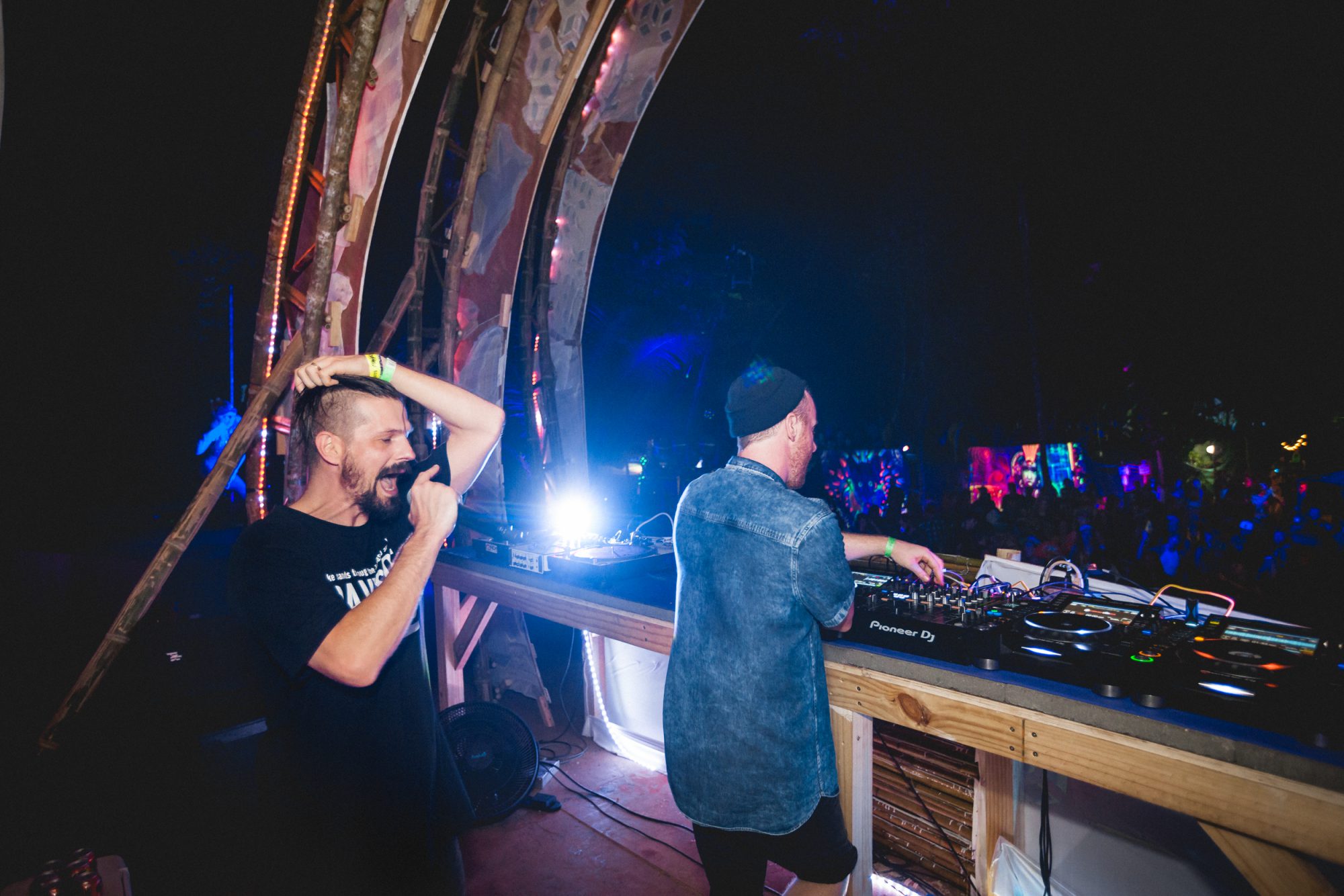
So you’re tryna straight up go out there and rap, or MC?
Lee: You know, we try to split it up a bit. Ya know, six or seven songs or something in a set, but the rest of it we’re just party rockin’ and DJing.
I had got the impression you were coming from kind of a socially conscious, lyrical realm. Are you kind of trying to maintain that as well?
Colin: Um, I mean, not so much. No, I mean, there’s never anything we really try and tie ourselves down to, like…
To not Pigeon Hole…?
Colin: Exactly. That’s the whole point, right? So, we always just do what feels right and what feels inspiring to us at the time. And wherever that takes us, that’s where we wind up going. That’s why our sound and we have evolved so much and changed so much over the years. Just because we’re not going to try and pin ourselves down, or hinder ourselves in any way.
Lee: But of course in the past, we’ve been fans of socially conscious music. And ya know, we like that element in music, so you may find it again at some point, but it just has to be the right time and place.
Connect with Pigeon Hole on Social Media:
Facebook | Twitter | Instagram | SoundCloud



